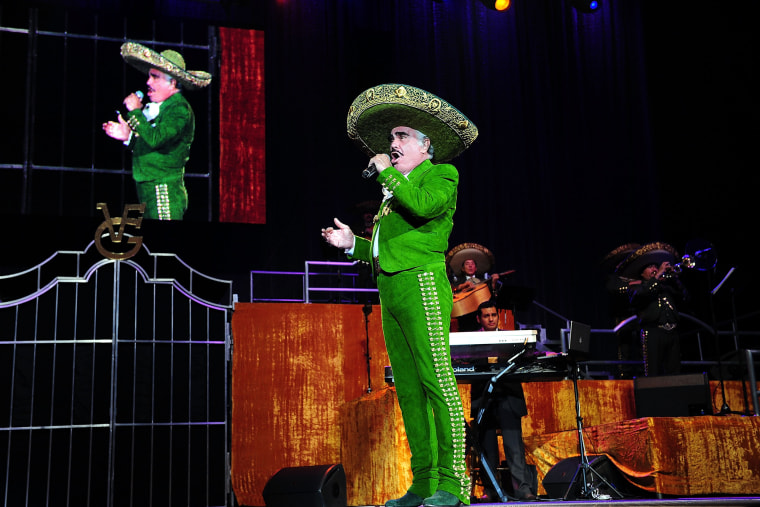Mexican entertainer Vicente Fernández, known as the “king of ranchera music,” revealed in a recent interview that he refused a liver transplant — and implied he did so out of concern that his donor could be a “homosexual or an addict.”
“They wanted to give me some other man’s liver, and I told them ‘I’m not going to sleep next to my wife with another man’s liver,’” Fernández, 79, said earlier this month on the Mexican TV program “De Primera Mano.” “I don’t even know if he was homosexual or an addict.”
Fernández, who said doctors had found a cancerous lump in his liver in 2012 when he was touring in Texas, then recalled leaving the hospital after refusing the transplant — against his doctor’s wishes.
“They didn’t want to let me leave, but I got dressed and started leaving,” Fernández recalled. “They said ‘Please, Mr. Vicente, at least leave in the wheelchair. If anything happens to you, they’ll shut down the hospital,’ so I left in the wheelchair.”
Fernandez is a well-respected figure in Mexican culture, known for recording more than 50 albums and contributing to more than 30 movies, but health care professionals in particular took issue with his remarks.
“Liver transplants are done when there are no other options,” Dr. Steven L. Flamm, the medical director of the liver transplant program at Northwestern Memorial Hospital, told NBC News. “Without a transplant, the rate of dying is greater than 75 percent within the first year or two, so it’s not something that should be easily dismissed.”
It’s unclear from the interview whether Fernández sought initial medical treatment in the U.S., where he was touring, or in Mexico, where he is based, but the singer said he eventually underwent a procedure in Chile that successfully removed the growth on his liver.
His statement, however, could lead to misconceptions surrounding organ donation and transplantation, according to Flamm, who said potential donors "go through a strict process of evaluation" and "extensive blood testing."
“I don’t know what being gay has to do with it,” Flamm said. “A healthy liver is a healthy liver, and sexuality cannot be transferred along with a liver.”
One organ donor can save up to eight lives, according to the U.S. Department of Health and Human Services. Yet research has found many individuals are reluctant to donate, either because they’ve grown to distrust the process after viewing medical television shows, or because they have religious or others ideological reasons for not doing so.
Many, including long-time fans, called Fernández out for his homophobic remarks on Twitter.
“Do you imagine being so homophobic that you reject the organ that could save you (a liver) because it could've belonged to an homosexual,” one user wrote.
“And the fact that the interviewer laughed at his remark is what’s wrong with the world. Sad to see Vicente Fernandez, someone that I’ve looked up to since birth, be homophobic,” another user wrote on Twitter, with a broken heart emoji.
But Fernández’s son, Vicente Fernandez Jr., defended his father against such accusations.
“My father did not say anything about being homophobic,” his son told the Mexican newspaper El Universal last week. “The only thing he said is that he would never go to sleep with the liver of another man.”
The younger Fernandez also attempted to clarify elements of his father’s story. He said that there was never an actual donor since the waiting list would have taken at least six to seven months, and that his father received treatment in Chicago, not Chile as he had claimed in the interview.



